
GROUP DECISION AND NEGOTIATION
Scope & Guideline
Illuminating the Path to Effective Group Decisions
Introduction
Aims and Scopes
- Group Decision-Making Models:
The journal extensively covers various models that facilitate group decision-making, including multi-criteria decision-making frameworks, consensus-building techniques, and negotiation strategies. - Negotiation Dynamics:
Research on the psychological and behavioral aspects of negotiation, including trust, deception, and communication strategies, is a core focus, exploring how these elements influence outcomes. - Application of Game Theory:
Many papers utilize game theory to analyze strategic interactions within negotiation contexts and group decision-making scenarios, providing valuable insights into cooperative and competitive behaviors. - Technological Integration in Decision Processes:
The journal examines the impact of technology, such as artificial intelligence and machine learning, on group decision-making and negotiation practices, highlighting innovations that improve efficiency and effectiveness. - Social and Ethical Considerations:
Research also addresses social dynamics, ethical implications, and equitable decision-making processes, particularly in diverse and multicultural group settings.
Trending and Emerging
- Digital Facilitation and Virtual Negotiations:
With the rise of remote work and virtual teams, there is an increasing focus on digital facilitation techniques and their effectiveness in enhancing group negotiations and decision-making processes. - Artificial Intelligence in Decision Support:
Research on leveraging AI technologies to support and enhance decision-making processes is gaining traction, exploring how machine learning and data analytics can improve outcomes. - Behavioral Insights in Negotiation:
There is a growing trend towards understanding the psychological and behavioral aspects of negotiation, including emotional intelligence, cognitive biases, and their impacts on group dynamics. - Sustainability and Ethical Decision-Making:
Emerging themes also include sustainability considerations in decision-making frameworks, emphasizing the importance of ethical implications and social responsibility in group negotiations. - Complex Adaptive Systems in Group Dynamics:
The application of concepts from complex adaptive systems to understand the fluid and dynamic nature of group decision-making processes is becoming more prevalent, reflecting the need for adaptable models.
Declining or Waning
- Traditional Negotiation Tactics:
There has been a noticeable decrease in papers focusing on conventional negotiation tactics and strategies, possibly due to the shift towards more complex, technology-driven approaches. - Individual-Level Decision Making:
Research concentrated solely on individual decision-making processes appears to be diminishing, as the journal increasingly emphasizes group dynamics and collective decision-making. - Static Decision-Making Models:
The use of static models for decision-making without considering dynamic or evolving contexts is becoming less prominent, reflecting a move towards more adaptive and responsive frameworks. - Gender-Specific Negotiation Studies:
While gender dynamics in negotiation were previously a popular topic, recent trends show a decline in research specifically focused on gender differences, possibly as the field evolves to incorporate broader diversity issues. - Basic Game Theory Applications:
The application of basic game theory concepts without innovative extensions or new contexts is declining, as researchers seek to develop more complex and applicable models in negotiation and decision-making.
Similar Journals
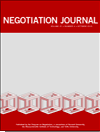
NEGOTIATION JOURNAL
Unlocking Insights in Conflict Resolution.Negotiation Journal, published by Wiley, has been a pivotal platform since its inception in 1985, providing insights into the multifaceted domain of negotiation and conflict resolution. With its ISSN 0748-4526 and E-ISSN 1571-9979, this journal focuses on the intricate dynamics encountered in negotiation processes across various fields, making it essential reading for researchers, professionals, and students alike. With a notable 2023 impact factor and quartile rankings of Q2 in Social Sciences and Q3 in Management of Technology and Innovation, the journal positions itself as a key contributor to both academic discourse and practical applications in negotiation strategies. Although it currently does not offer open access, the journal’s comprehensive blend of theoretical research and empirical studies enhances its relevance in today’s complex societal interactions. Researchers can look forward to contributing to and benefiting from a repository of knowledge, aimed at advancing the understanding of negotiation behavior and outcomes.
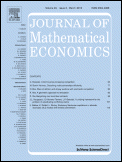
JOURNAL OF MATHEMATICAL ECONOMICS
Empowering Economic Insights through Mathematical Precision.JOURNAL OF MATHEMATICAL ECONOMICS, published by Elsevier Science SA, is a premier journal that bridges the gap between mathematics and economics, making significant contributions to both fields since its inception in 1974. This journal is dedicated to publishing high-quality research that applies mathematical methods to solve complex economic problems, thus nurturing an interdisciplinary dialogue essential for advancing both theoretical and practical applications in economics. With an impact factor that reflects its esteemed position (Q2 in Applied Mathematics and Economics and Econometrics as of 2023), the journal ranks prominently within its categories, promoting rigorous analysis and innovative methodologies. The Journal of Mathematical Economics invites contributions from researchers, professionals, and students alike, providing a platform for the dissemination of cutting-edge research that shapes economic thought and policy. Operating without open access, it remains a crucial resource for anyone keen to delve deeper into the mathematical foundations of economic theory, while it continues to evolve and maintain relevance through 2024 and beyond.

MEDICAL DECISION MAKING
Innovating methodologies for impactful medical research.Medical Decision Making is a premier journal published by SAGE Publications Inc, dedicated to advancing the field of health policy through rigorous research, innovative methodologies, and comprehensive analyses. Since its inception in 1981, it has established itself as a leading platform for disseminating significant findings, and it proudly holds a Q1 ranking in the health policy category, underscoring its commitment to excellence within the academic community. With an impressive Scopus rank of 43 out of 310, the journal ranks in the top 14% of its field, reflecting its influential contributions to medical decision-making processes. Medical Decision Making serves a diverse audience of researchers, practitioners, and policymakers by providing scholarly articles that blend theoretical insights with practical applications, ultimately improving patient care and health outcomes. The journal's dedicated following and its continued relevance through to 2024 position it as an essential resource for anyone vested in the evolution and implementation of effective health policies.

THEORY AND DECISION
Exploring the Intersection of Theory and Practical Decision-MakingTHEORY AND DECISION is a prestigious academic journal published by SPRINGER, which has been a cornerstone of interdisciplinary research since its inception in 1970. With an ISSN of 0040-5833 and an E-ISSN of 1573-7187, this journal offers valuable insights into a range of fields, including Applied Psychology, Decision Sciences, Economics, and more. Holding a remarkable position within various quartile rankings, such as Q1 in Arts and Humanities and Q2 in Economics, it signifies the journal's impact and relevance in modern academic discourse. Although not presently open access, it remains accessible to researchers and institutions that prioritize impactful studies and theoretical advancements. The journal's objectives include exploring decision-making processes and theoretical underpinnings that inform practical applications across disciplines, making it an essential resource for academics, professionals, and students dedicated to advancing knowledge in their respective fields. THEORY AND DECISION continues to shape the landscape of interdisciplinary research, providing a platform for innovative ideas and discussions that are crucial in today’s complex world.

JOURNAL OF EXPERIMENTAL SOCIAL PSYCHOLOGY
Exploring the Depths of Human BehaviorJOURNAL OF EXPERIMENTAL SOCIAL PSYCHOLOGY, published by Academic Press Inc, Elsevier Science, stands as a pivotal resource in the fields of social psychology and sociology, recognized for its high impact factor and placement in the top quartile rankings (Q1) of both disciplines. Serving the global academic community since 1965, this journal specializes in the rigorous exploration of social psychological phenomena, contributing to our understanding of human behavior and societal dynamics through methodologically sound experimental research. With a significant Scopus ranking, positioning it in the 92nd and 82nd percentiles among its peers in Sociology and Political Science and Social Psychology respectively, it is widely acknowledged for both its scholarly quality and its influential content. Although it operates under traditional access models, the journal continues to foster impactful discussions in social psychological research, making it an essential read for researchers, professionals, and students dedicated to advancing knowledge in the social sciences.

Decision
Fostering Innovation in Decision-Making ResearchDecision is a prestigious journal published by Springer, focusing on the multifaceted field of decision-making processes across various domains such as psychology, economics, management, and social sciences. With the ISSN 0304-0941 and E-ISSN 2197-1722, this journal serves as a critical platform for the dissemination of high-quality research articles, providing insights into theoretical frameworks and empirical studies that shape our understanding of decision-making. Although currently not open access, articles may be available through institutional subscriptions, ensuring that a wide audience can engage with the latest findings in the field. The journal's commitment to enhancing scholarly communication and its rigorous peer-review process underscore its importance in fostering a deeper understanding of the complexities within decision sciences. Researchers, professionals, and students are encouraged to contribute and stay informed through this essential resource located at One New York Plaza, Suite 4600, New York, NY 10004, United States.
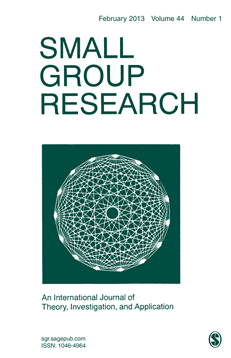
SMALL GROUP RESEARCH
Illuminating the Interplay of Relationships and BehaviorSMALL GROUP RESEARCH is a premier academic journal published by SAGE Publications Inc, dedicated to advancing the field of psychology through an in-depth focus on group dynamics, interpersonal relationships, and social behavior. Established in 1970, this journal has successfully carved out a significant niche within both Applied Psychology and Social Psychology, earning a commendable Q2 status in Applied Psychology and a prestigious Q1 ranking in Social Psychology as of 2023. With an impressive Scopus ranking, placing it in the 85th and 76th percentiles respectively in its categories, SMALL GROUP RESEARCH is committed to publishing high-quality, peer-reviewed research that explores the complexity of small group interactions and their implications for broader psychological practices. Researchers, professionals, and students alike will find valuable insights and a collaborative environment within these pages, making it essential for anyone wishing to deepen their understanding of group processes in a variety of contexts.
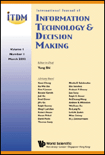
INTERNATIONAL JOURNAL OF INFORMATION TECHNOLOGY & DECISION MAKING
Advancing the Frontiers of Tech-Driven Decision MakingINTERNATIONAL JOURNAL OF INFORMATION TECHNOLOGY & DECISION MAKING, published by WORLD SCIENTIFIC PUBL CO PTE LTD, stands as a premier platform in the realm of computer science, focusing particularly on the intersection of information technology and decision sciences. Established in 2002, the journal has consistently published high-quality research, now recognized as a Q1 journal in Computer Science (miscellaneous) as of 2023, ranking 15th out of 133 in its category, which underscores its excellence and influence in the field. Although it does not currently offer Open Access options, the journal remains accessible to a broad audience of researchers, professionals, and students who seek to enhance their understanding of innovative decision-making methodologies powered by information technology. With an emphasis on interdisciplinary collaboration, this journal is dedicated to advancing theoretical and practical knowledge, making it an essential resource for anyone looking to stay at the forefront of technology-driven decision-making processes.

RATIONALITY AND SOCIETY
Navigating the Landscape of Rational Behavior and SocietyRationality and Society, published by SAGE Publications Ltd, is an influential academic journal that has been consistently contributing to the fields of social sciences, sociology, and political science since its inception in 1989. With an impressive impact factor that places it in the top quartile (Q1) of its category, the journal serves as a vital platform for researchers and scholars to engage with contemporary issues related to rational behavior in societal contexts. Located in the United Kingdom, it offers an extensive range of insightful articles that interrogate various aspects of rationality, decision-making, and social structures, ensuring quality discourse for its readers. Although it is not an open-access publication, its rigorous peer-review process and esteemed editorial board enhance its reputation and credibility in the academic community. Targeting professionals, students, and researchers, Rationality and Society is essential reading for those seeking to explore the complexities of human behavior and its implications for society.
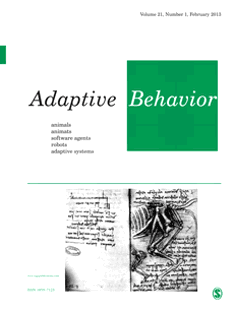
ADAPTIVE BEHAVIOR
Fostering Dialogue on Adaptive Strategies in Psychology and AIADAPTIVE BEHAVIOR is a renowned academic journal published by SAGE PUBLICATIONS LTD, dedicated to advancing the understanding of adaptive mechanisms in behavior across a spectrum of disciplines. With a focus on Artificial Intelligence, Behavioral Neuroscience, and Experimental and Cognitive Psychology, this journal aims to facilitate the dissemination of innovative research and theoretical advancements that relate to adaptive behaviors in both humans and artificial systems. The journal, which spans from 1992 to 2024, holds a commendable position within its field, ranked in the Q3 category for multiple categories, and Q1 in Philosophy. Furthermore, it is recognized within Scopus rankings, ensuring its impact and relevance in the academic community, with a notable rank of #57 in Experimental Psychology and #49 in Behavioral Neuroscience. While ADAPTIVE BEHAVIOR does not currently offer Open Access options, it maintains a vital role in bridging disciplines and fostering discourse among researchers, professionals, and students who are exploring the complexities of behavior in adaptive systems.